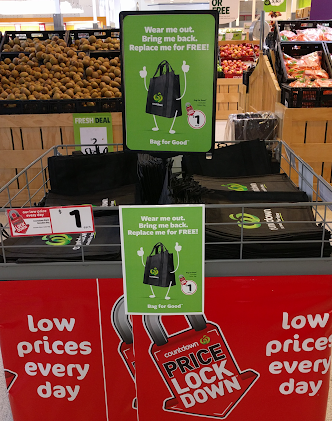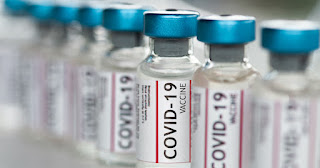Plastic bag hate: Environmentalism and virtue signalling
The photo above shows the marketing campaign for plastic bag alternatives that confronted me, directly inside the doors at my local Countdown supermarket. It raises an obvious question: if these bags are being replaced for free, do they really have less environmental impact than plastic ones? Common sense reasons that since they’re selling for a dollar with a low profit margin, as opposed to given away free, the cost is far higher - at least a hundred times higher. Indeed common sense based on prices is supported by the experts.
Using less plastic looks good, like you're doing something helpful - but you're probably not. Usually, contrary to the common belief, going out of your way to use less plastic bags is bad for the environment:
1. Plastic pollution is not a significant problem in countries with good waste disposal.
2. A UK government study showed that in order for one of those cotton carry bags to have less environmental impact than plastic bags, it has to be used 131 times. And that's assuming the plastic bags aren't used more than once, which is probably false (e.g. people re-use them as bags to carry other things, or as bin liners which saves water for cleaning). So for example, assuming you use cotton bags once a week, and you were previously re-using only half of your plastic bags, you need to use the cotton ones every week for almost four years just to break even. So if you use them for much less than four years, you would've had less environmental impact by using plastic bags instead. And if you use them for five years, the gain is only marginal. How often do these new bags really last for five years of weekly use? I've had them break before anywhere close to that. These ones Countdown is selling are quite flimsy, I’d be surprised if they last for 131 uses.
Environmentalists often denigrate the wisdom of the market, but it’s usually more correct than any prescriptionism. Plastic bags are incredibly cheap (fractions of a cent), and light, making them far from easy to beat, assuming they're disposed of correctly (which they generally are in the West).
This is an example of how non-renewables are often better for the environment than renewables.
So much of environmentalism is like this: doing little things that achieve effectively nothing, and thanks to self-licensing, further avoiding doing things that would actually help. Things like driving less, buying less of all kinds of non-foodstuffs, or much better, doing things to help the economies of the countries doing the significant plastic polluting, like giving to effective overseas charities or micro-loans that actually get people out of poverty. Environmentalism is so often a demonstration of complete failure of prioritization, encouraged by self-righteous congratulations.
Of course it's fundamentally worse than that because most people can't even say what "the environment" is. It’s a deliberately vague term that sounds like it’s about plants and animals, but usually isn’t. For instance, why is climate change (not pollution) even bad? Assuming that the problem is as bad as many say (it's far more complex than the ideology makes out), then the answer is because it inconveniences humans. For instance more CO2 is great for forests, and by extension, the animals that live in them. Historically the planet has thrived on extreme climate change. So really, to use Al Gore’s word: we're supposed to do inconvenient things now to save on possible inconvenience in the future. Is this any kind of win?
 |
| it's not really like this at all |
At least let’s not make things free that are really expensive. And for goodness sake not ban things that are both convenient and better than the alternatives - like plastic bags.





Comments
Post a Comment